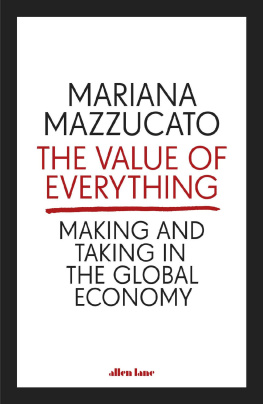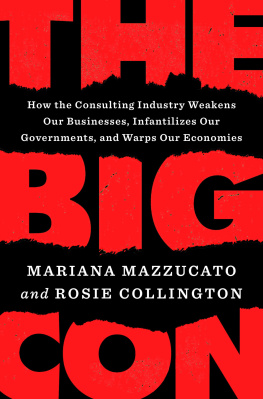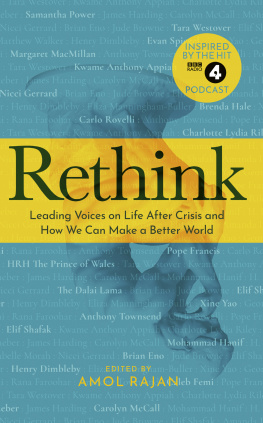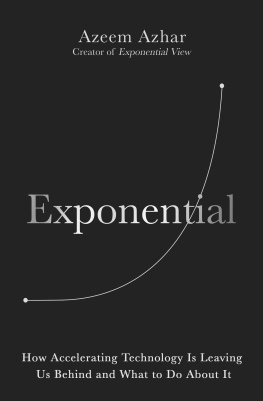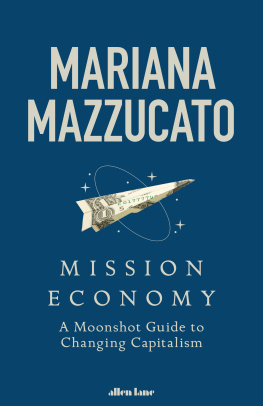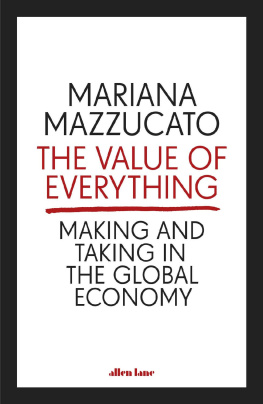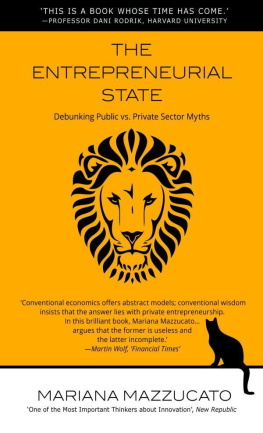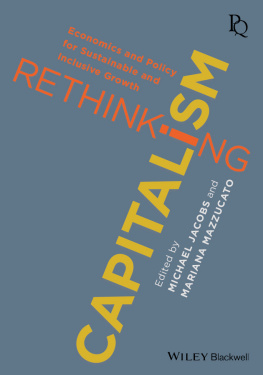Mazzucato - The Value of Everything
Here you can read online Mazzucato - The Value of Everything full text of the book (entire story) in english for free. Download pdf and epub, get meaning, cover and reviews about this ebook. year: 2018;2009, publisher: Penguin Books Ltd, genre: Politics. Description of the work, (preface) as well as reviews are available. Best literature library LitArk.com created for fans of good reading and offers a wide selection of genres:
Romance novel
Science fiction
Adventure
Detective
Science
History
Home and family
Prose
Art
Politics
Computer
Non-fiction
Religion
Business
Children
Humor
Choose a favorite category and find really read worthwhile books. Enjoy immersion in the world of imagination, feel the emotions of the characters or learn something new for yourself, make an fascinating discovery.
The Value of Everything: summary, description and annotation
We offer to read an annotation, description, summary or preface (depends on what the author of the book "The Value of Everything" wrote himself). If you haven't found the necessary information about the book — write in the comments, we will try to find it.
The Value of Everything — read online for free the complete book (whole text) full work
Below is the text of the book, divided by pages. System saving the place of the last page read, allows you to conveniently read the book "The Value of Everything" online for free, without having to search again every time where you left off. Put a bookmark, and you can go to the page where you finished reading at any time.
Font size:
Interval:
Bookmark:


For Leon, Micol, Luce and Sofia
We often hear businesses, entrepreneurs or sectors talking about themselves as wealth-creating. The contexts may differ finance, big pharma or small start-ups but the self-descriptions are similar: I am a particularly productive member of the economy, my activities create wealth, I take big risks, and so I deserve a higher income than people who simply benefit from the spillovers of this activity. But what if, in the end, these descriptions are simply just stories? Narratives created in order to justify inequalities of wealth and income, massively rewarding the few who are able to convince governments and society that they deserve high rewards, while the rest of us make do with the leftovers.
In 2009 Lloyd Blankfein, CEO of Goldman Sachs, claimed that The people of Goldman Sachs are among the most productive in the world. Despite everything, Goldman along with other banks and hedge funds proceeded to bet against the very instruments which they had created and which had led to such turmoil.
Although there was much talk about punishing those banks that had contributed to the crisis, no banker was jailed, and the changes And although the US government saved the banking system with taxpayers money, the government did not have the confidence to demand a fee from the banks for such high-risk activity. It was simply happy, in the end, to get its money back.
Financial crises, of course, are not new. Yet Blankfeins exuberant confidence in his bank would have been less common half a century ago. Until the 1960s, finance was not widely considered a productive part of the economy. It was viewed as important for transferring existing wealth, not creating new wealth. Indeed, economists were so convinced about the purely facilitating role of finance that they did not even include most of the services that banks performed, such as taking in deposits and giving out loans, in their calculations of how many goods and services are produced by the economy. Finance sneaked into their measurements of Gross Domestic Product (GDP) only as an intermediate input a service contributing to the functioning of other industries that were the real value creators.
In around 1970, however, things started to change. The national accounts which provide a statistical picture of the size, composition and direction of an economy began to include the financial sector in their calculations of GDP, the total value of the goods and services produced by the economy in question. This change in accounting coincided with the deregulation of the financial sector which, among other things, relaxed controls on how much banks could lend, the interest rates they could charge and the products they could sell. Together, these changes fundamentally altered how the financial sector behaved, and increased its influence on the real economy. No longer was finance seen as a staid career. Instead, it became a fast track for smart people to make a great deal of money. Indeed, after the Berlin Wall fell in 1989, some of the cleverest scientists in Eastern Europe ended up going to work for Wall Street. The industry expanded, grew more confident. It openly lobbied to advance its interests, claiming that finance was critical for wealth creation.
Today the issue is not just the size of the financial sector, and how it has outpaced the growth of the non-financial economy (e.g. industry), but its effect on the behaviour of the rest of the economy, large parts of which have been financialized. Financial operations and the mentality they breed pervade industry, as can be seen when managers choose to spend a greater proportion of profits on share buy-backs which in turn boost stock prices, stock options and the pay of top executives than on investing in the long-term future of the business. They call it value creation but, as in the financial sector itself, the reality is often the opposite: value extraction.
These stories of value creation are not limited to finance. In 2014 the pharmaceutical giant Gilead priced its new treatment for the life-threatening hepatitis C virus, Harvoni, at $94,500 for a three-month course. Gilead justified charging this price by insisting that it represented value to health systems. John LaMattina, former President of R&D at the drugs company Pfizer, argued that the high price of speciality drugs is justified by how beneficial they are for patients and for society in general. In practice, this means relating the price of a drug to the costs that the disease would cause to society if not treated, or if treated with the second-best therapy available. The industry calls this value-based pricing. Its an argument refuted by critics, who cite case studies that show no correlation between the price of cancer drugs and the benefits they provide.
Yet drug prices are not falling. It seems that the industrys value creation arguments have successfully neutralized criticism. Indeed, a high proportion of health care costs in the Western world has nothing to do with health care: these costs are simply the value the pharmaceutical industry extracts.
Or consider the way that entrepreneurs in the dot.com and IT industry lobby for advantageous tax treatment by governments in the name of wealth creation. With innovation as the new force in modern capitalism, Silicon Valleys do-gooders have successfully projected themselves as the entrepreneurs and garage tinkerers who unleash the creative destruction from which the jobs of the future come. These new actors, from Google to Uber to Airbnb, are often described as the wealth creators.
Yet this seductive story of value creation leads to questionable broader tax policies by policymakers: for example, the patent box policy that reduces tax on any products whose inputs are patented, supposedly to incentivize innovation by rewarding the generation of intellectual property. Its a policy that makes little sense, as patents are already monopolies which should normally earn high returns. Policymakers objectives should not be to increase the profits from monopolies, but to favour investments in areas like research.
Many of the so-called wealth creators in the tech industry, like the co-founder of Pay Pal, Peter Thiel, often lambast government as a pure impediment to wealth creation. Thiel went so far as to set up a secessionist movement in California so that the wealth creators could be as independent as possible from the heavy hand of government. When Eric Schmidt, CEO of Google, was quizzed about the way companies control our personal data, he replied with what he assumed was a rhetorical question: Would you prefer government to have it? His reply fed a modern-day banality: entrepreneurs good, government bad.
Yet in presenting themselves as modern-day heroes, Apple and other companies conveniently ignore the pioneering role of government in new technologies. Apple has unashamedly declared that its contribution to society should not be sought through tax but through recognition of its great gizmos. But doesnt the taxpayer who helped Apple create those products and the record profits and cash mountain they have generated deserve something back, beyond a series of undoubtedly brilliant gadgets? Simply to pose this question, however, underlines how we need a radically different type of narrative as to who created the wealth in the first place and who has subsequently extracted it.
Font size:
Interval:
Bookmark:
Similar books «The Value of Everything»
Look at similar books to The Value of Everything. We have selected literature similar in name and meaning in the hope of providing readers with more options to find new, interesting, not yet read works.
Discussion, reviews of the book The Value of Everything and just readers' own opinions. Leave your comments, write what you think about the work, its meaning or the main characters. Specify what exactly you liked and what you didn't like, and why you think so.

